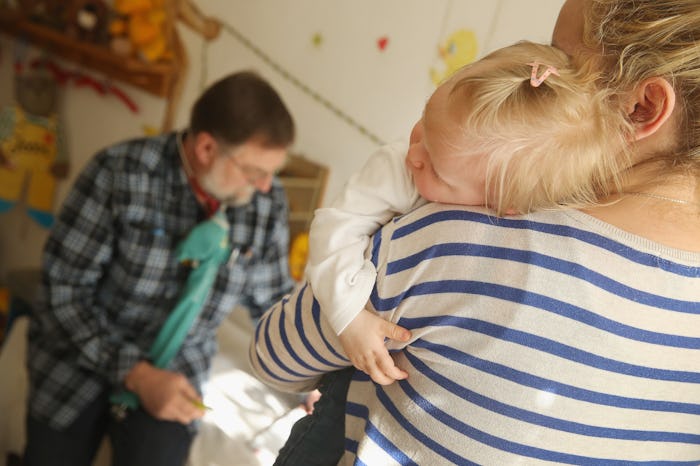News

Measles Vaccine Doesn’t Cause Autism, Largest Study In Recent History Shows
One of the more hotly debated topics in parenting and health for years has been the safety of vaccinations. Though some believe that they are decidedly unsafe for kids and result in cognitive (and other) issues down the line, the largest study in recent history shows yet again that the measles vaccine doesn't cause autism.
The study, which was released by the Annals of Internal Medicine, couldn't have come out at a better time. CNN reported that there's an unprecedented outbreak of measles in the past year, with a reported 107 cases in the United States. This is directly caused by the fact that some anti-vaxx parents are refusing to vaccinate their children, thereby decreasing herd immunity, and bringing back deadly illnesses that were once virtually eradicated.
The study followed children of Danish-born mothers from 1999 to 2010 ― monitoring the health of 657,461 kids — and found that the measles, mumps and rubella (MMR) vaccine did not have any correlation with an autism diagnosis later in their lives, nor was there any correlation between the uptick in vaccinations over the past few decades and the number of autistic children being diagnosed worldwide.
Ultimately, the study proved that the MMR vaccine is, indeed, safe.
Of the children observed, HuffPost reported that 6,517 were eventually diagnosed with autism as they got older, but that there was no association between that diagnosis and the presence of one vaccine or another. The researchers explained in the publication:
The study strongly supports that MMR vaccination does not increase the risk for autism, does not trigger autism in susceptible children, and is not associated with clustering of autism cases after vaccination. It adds to previous studies through significant additional statistical power.
Other variables that were taken into account were sibling diagnoses of autism, as well as issues such as age, birth year, sex, a history of other childhood vaccines and other autism risk factors. Ultimately, even with all of that taken into consideration, there was still no association.
The reason why the theory that vaccines cause autism took such a hold on the public consciousness in the first place dates back to 1998, when a now-debunked study claimed that was the case. As Vox has reported, the incident is being dubbed research fraud, but has unfortunately had an ongoing impact on the minds and beliefs of many people around the world. These people believe that they're protecting their children against an autism diagnosis at the risk of potentially losing their lives to a deadly disease, or endangering the lives of those who legitimately cannot receive vaccines for health reasons.
In the time since, there's been a significant amount of other research conducted to prove that vaccinations are safe. Shortly after the 1998 research, in 2002, a more comprehensive study was released by the New England Journal of Medicine which disproved the theory:
"After adjustment for potential confounders, the relative risk of autistic disorder in the group of vaccinated children, as compared with the unvaccinated group, was 0.92 (95 percent confidence interval, 0.68 to 1.24), and the relative risk of another autistic-spectrum disorder was 0.83 (95 percent confidence interval, 0.65 to 1.07)," the study's authors explained. "There was no association between the age at the time of vaccination, the time since vaccination, or the date of vaccination and the development of autistic disorder."
In 2015, the JAMA Network released data from a study of 100,000 children which found no evidence of association between vaccinations and autism diagnoses, even for children who are the siblings of those with autism (a known risk factor).
Of course, those are just two examples of a growing body of research proving that despite what some continue to believe, there's no risk to getting a child vaccinated as far as autism or other cognitive issues are concerned. There is, however, a significant threat posed when herd immunity is diminished, and deadly diseases that were formerly eliminated have the potential to wreak havoc on humanity once again.